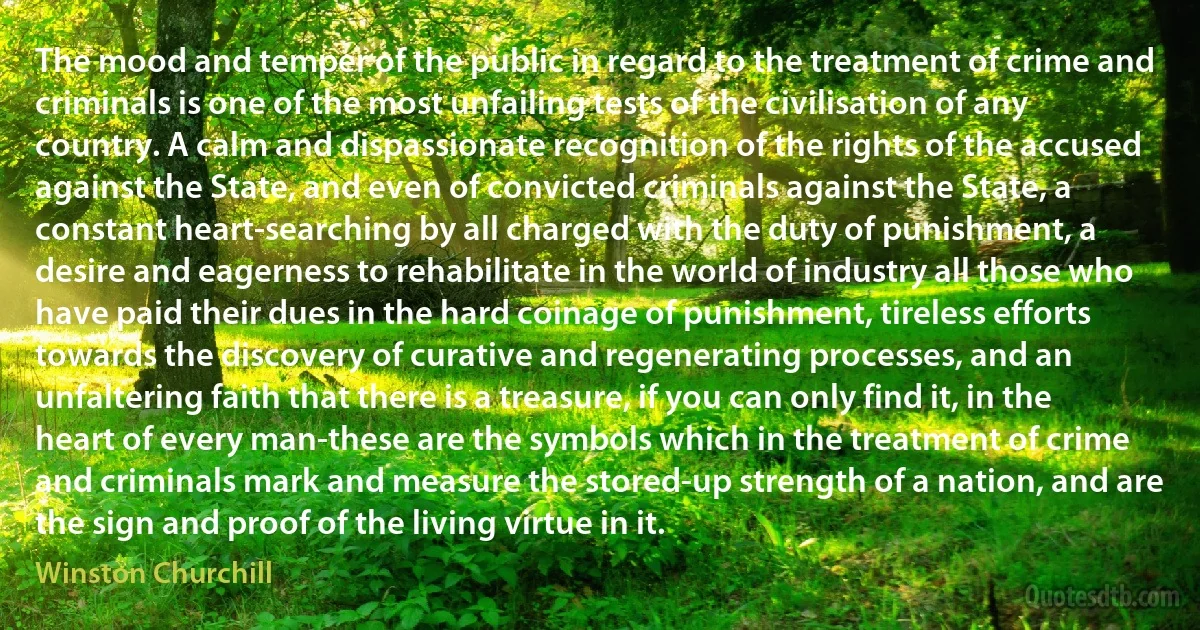
The mood and temper of the public in regard to the treatment of crime and criminals is one of the most unfailing tests of the civilisation of any country. A calm and dispassionate recognition of the rights of the accused against the State, and even of convicted criminals against the State, a constant heart-searching by all charged with the duty of punishment, a desire and eagerness to rehabilitate in the world of industry all those who have paid their dues in the hard coinage of punishment, tireless efforts towards the discovery of curative and regenerating processes, and an unfaltering faith that there is a treasure, if you can only find it, in the heart of every man-these are the symbols which in the treatment of crime and criminals mark and measure the stored-up strength of a nation, and are the sign and proof of the living virtue in it.
Winston ChurchillRelated topics
accused calm coinage constant country crime curative desire duty eagerness faith find hard heart industry living mark measure nation pay proof public punishment sign state strength temper treasure virtue world civilisationRelated quotes
I dwell on this prospect with every satisfaction which an ardent love for my Country can inspire: since there is no truth more thoroughly established, than that there exists in the oeconomy and course of nature, an indissoluble union between virtue and happiness, between duty and advantage, between the genuine maxims of an honest and magnanimous policy, and the solid rewards of public prosperity and felicity: Since we ought to be no less persuaded that the propitious smiles of Heaven, can never be expected on a nation that disregards the eternal rules of order and right, which Heaven itself has ordained: And since the preservation of the sacred fire of liberty, and the destiny of the Republican model of Government, are justly considered as deeply, perhaps as finally staked, on the experiment entrusted to the hands of the American people.

George Washington
In combination with other infernal contraptions, like rockets to deliver bombs at large distances, chemical, biological and radioactive poisons, such a war must mean a degree of human suffering and degradation which is beyond the power of imagination. No country would be immune, but those with highly developed industry would suffer most. It is very doubtful whether our technological civilization would survive such a catastrophe.
One may be inclined to regard this as no great loss, but as a just punishment for its shortcomings and sins: the lack of productive genius in art and literature, the neglect of the moral teachings of religion and philosophy, the slowness to abandon outdated political conceptions, like national sovereignty. Yet we are all involved in this tragedy, and the instinct of self-preservation, the love of our children, makes us think about a way of salvation.

Max Born
If the women but have little virtue, the jealousy of their husbands is extreme, and their revenge deadly and almost certain. A few inches of cold steel have been the punishment of many an unwary man, who has been guilty, perhaps, of nothing more than indiscretion. The difficulties of the attempt [to copulate with a married woman] are numerous, and the consequences of discovery fatal, in the better classes. With the unmarried women, too, great watchfulness is used. The main object of the parents is to marry their daughters well, and to this a fair name is necessary. The sharp eyes of a duena, and the ready weapons to a father or brother, are a protection which the characters of most of them - men and women - render by no means useless; for the very men who would lay down their lives to avenge the dishonor of their own family would risk the same lives to complete the dishonor of another.

Richard Henry Dana, Jr.
All the virtues which appeared in Christ shone brightest in the close of His life, under the trials He then met. Eminent virtue always shows brightest in the fire. Pure gold shows its purity chiefly in the furnace. It was chiefly under those trials which Christ endured in the close of His life, that His love to God, His honor of God's majesty, His regard to the honor of His law, His spirit of obedience, His humility, contempt of the world, His patience, meekness, and spirit of forgiveness towards men, appeared. Indeed, every thing that Christ did to work out redemption for us appears mainly in the close of His life. Here mainly is His satisfaction for sin, and here chiefly is His merit of eternal life for sinners, and here chiefly appears the brightness of His example which He has set us for imitation.

Jonathan Edwards (theologian)
Perhaps there is nobody who would sacrifice his life for the sake of maintaining that the three angles of a triangle are together equal to two right angles, for such a truth does not demand the sacrifice of our life; but, on the other hand, there are many who have lost their lives for the sake of maintaining their religious faith. Indeed, it is truer to say that martyrs make faith than that faith makes martyrs. For faith is not the mere adherence of the intellect to an abstract principle; it is not the recognition of a theoretical truth, the process in which the will merely sets in motion our faculty of comprehension; faith is an act of the will - it is a movement of the soul towards a practical truth, towards a person, towards something that makes us not merely comprehend life, but that makes us live.

Miguel de Unamuno
